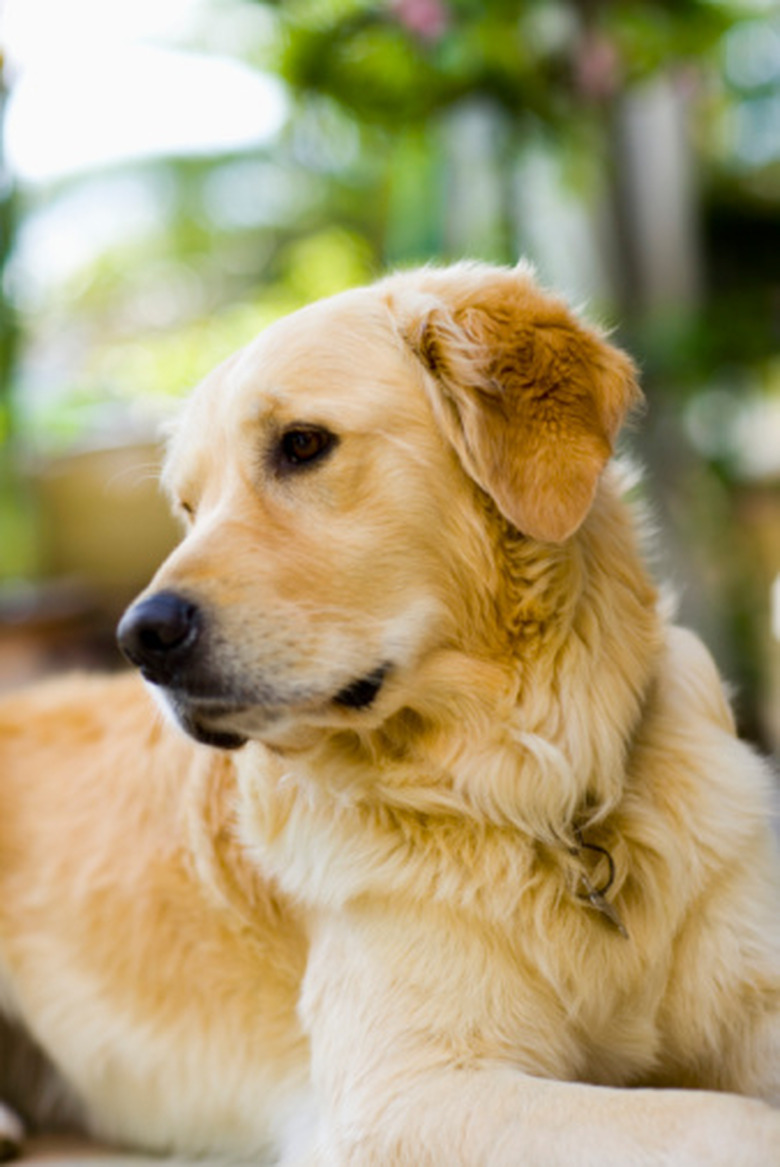How Do I Treat My Golden Retriever's Dry Skin?
Things Needed
-
Fish oil
-
Oatmeal
-
Dog shampoo
-
Dog brush
Warning
If you notice your golden retriever having severe symptoms combined with the dry skin, such as swelling in the face and paws, excessive drooling or difficulty breathing, your dog could be having a life-threatening allergic reaction. Take it to the vet immediately.
Golden retrievers can easily develop hot spots — open, oozing sores that are typically caused by fleas or allergies. Although they begin as small irritations, they can quickly escalate. To treat the hot spot, shave off the hair surrounding it to promote air circulation around the spot.
Tip
Avoid bathing the dog too often; this removes vital oils from the golden retriever's skin that work as moisturizers.
Only use dog shampoos when you bathe your dog. Human shampoos can be harsh on the dog's skin. Dog shampoos are designed specifically to lubricate a golden retriever's skin.
Like humans, golden retrievers can suffer from dry skin. Unfortunately, the dogs worsen the problem by scratching, biting and licking their skin. Dry skin in dogs is typically an indication of a larger problem, however; allergies, parasites or infections could be the reason for your dog's skin irritation. As the owner, you must take steps to prevent dry skin from occurring or treat dry skin that already exists before it becomes a larger problem.
Step 1
Apply fish oil to your dog's skin; apply it to infected areas or brush it over the entire coat. Fish oil is a safe, natural remedy you can use at home to relieve irritation. It helps to lubricate and sooth dry, itchy skin in dogs.
Step 2
Mix oatmeal and water together. Bathe your dog in the mixture and leave it on your dog's skin for 10 minutes before rinsing. If neither the fish oil nor the oatmeal work, your dog may have a problem beyond dry skin.
Step 3
Evaluate your golden retriever's routines to determine whether an allergen is causing the skin irritation. For instance, if the skin recently became dry and itchy, think about anything you've just introduced to the dog, such as a new food or grooming product. Note times that your dog seems especially uncomfortable; if he's extremely itchy after his walk, an outdoor allergen could be to blame. If you suspect your dog has an allergy, visit the vet, who may prescribe a medicated bath and a topical treatment to relieve the irritation.
Step 4
Place your dog on a white sheet and stand over him to brush the coat to inspect it for fleabites or fleas. White or black grains are flea eggs and feces. To treat a flea problem, you must eliminate all fleas in the environment. Every pet in the house must be treated, even if they haven't been affected. A medicated bath prescribed by your vet will help to alleviate irritation, and antihistamines or corticosteroids may be prescribed to curb itching.
Step 5
Brush the dog's hair regularly (daily is best). Brushing removes the dead hair and dander that can quickly build up on golden retrievers, which are prone to shedding.
Always check with your veterinarian before changing your pet's diet, medication, or physical activity routines. This information is not a substitute for a vet's opinion.
